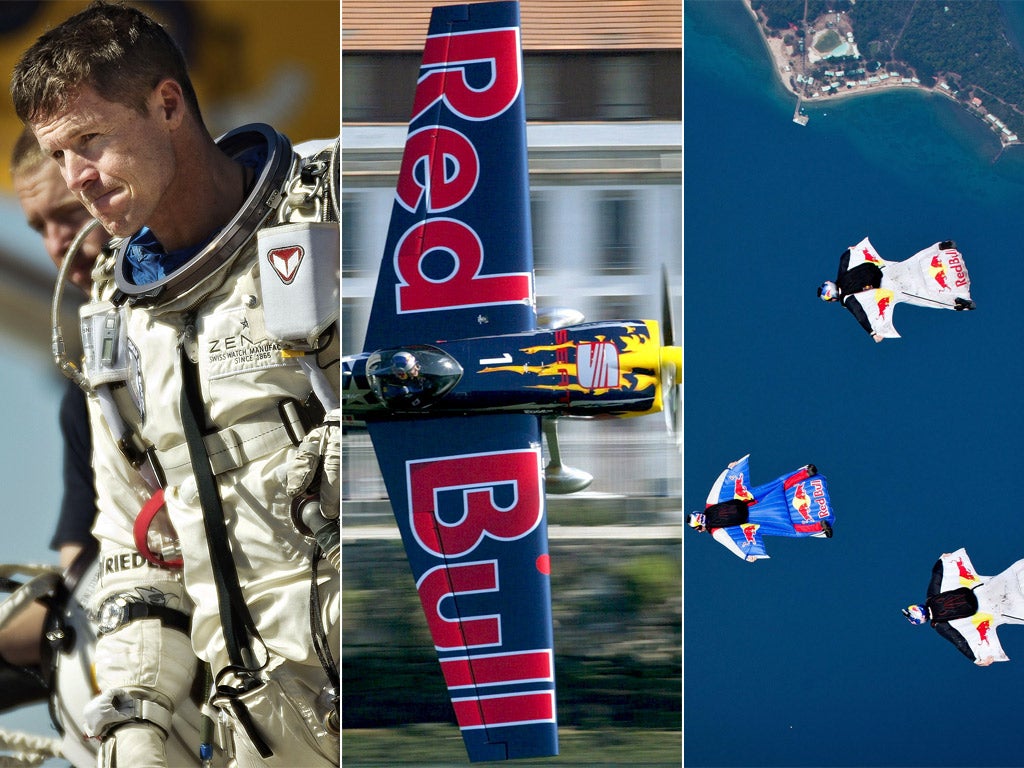The Independent's journalism is supported by our readers. When you purchase through links on our site, we may earn commission.
Sponsorship: The colour of money
As Red Bull prepares to send a man into the stratosphere, Simon Usborne examines its extreme-sports business plan

Fearless Felix Baumgartner talked about his "total disappointment" yesterday after his mission to the edge of space was aborted at T-minus-no-seconds on Tuesday, apparently because of high winds. For "total" read "temporary"; the skydiver will make a second bid for the record books with the highest, fastest jump, as soon as conditions allow.
Similarly disappointed will have been his fellow Austrian, Dietrich Mateschitz, arguably the world's greatest marketing genius. A bored, grey-suited businessman in his late 30s, he was struck by the popularity of a peculiar tonic during a trip to Thailand. He took the drink, added fizz, and called it Red Bull. It was 1987.
Today, Mateschitz is worth £3.3bn and never wears grey. The quiet, unorthodox tycoon (Richard Branson without the ego) has single-handedly created a drinks category and filled it with an expensive, arguably foul-tasting liquid for which a high-energy world has an unquenchable thirst (Red Bull sold 4.6 billion cans last year).
Now Mateschitz is about to send a man 23 miles up into the stratosphere, where he will try to break the sound barrier as he falls back to earth. The jump, presented as a science experiment, is Red Bull's greatest publicity stunt yet (rumours circulated in parts of the media on Tuesday that Red Bull always planned to abort the first launch to prolong its exposure) and seals a remarkable stranglehold on sports branding.
If you're really good at nearly killing yourself and you wear a helmet, you can expect a call from Red Bull. The company owns two Formula One teams and has put it name to, or created, dozens of sports and events for pilots, wing-suited skydivers, wake-boarders, cliff divers, skiers and snowboarders.
Baumgartner, 43, was one of Red Bull's first sponsored athletes (there are now at least 400). In 2003, he skydived across the English Channel under a special wing, like a real-life Buzz Lightyear, forcing the Red Bull logo to infinity and beyond, or at least on to global bulletins and newstands.
Rob Frankel, a US branding consultant, says far from being pioneering, Red Bull is merely "doing a promotion right". He adds: "Red Bull doesn't pretend to be anything... its brand strategy is clearer, making it able to select its activities and partners more accurately. Coca-Cola tries to be everything to everyone. Red Bull doesn't." Or as Danny Bahar, Red Bull's former chief operating officer and the man who leads its move into motor racing has said: "We focus on brand experience activities... People should feel our brand and want to become part of it."
Red Bull's lifestyle approach now extends beyond sport into music and media. It has a record label and publishing arm. Clips of its athletes dominate YouTube while last year it threw millions at its first feature film, The Art of Flight (about snowboarding).
There have been four deaths among Red Bull athletes, and occasional sales dips, but nothing seems able to blow the branding rocket off course. One suspects it will take more than a light breeze to prevent Baumgartner taking Red Bull to its greatest height. Mateschitz will be watching.
Subscribe to Independent Premium to bookmark this article
Want to bookmark your favourite articles and stories to read or reference later? Start your Independent Premium subscription today.

Join our commenting forum
Join thought-provoking conversations, follow other Independent readers and see their replies